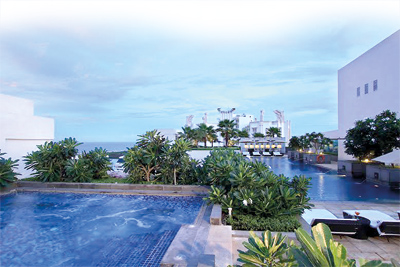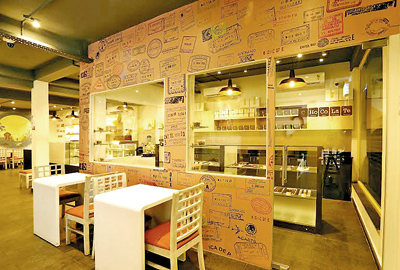Chennai’s hospitals fuel hospitality boom
Tamil Nadu recorded the year’s highest influx of tourists both domestic and international. Extraordinarily, Rajasthan’s tourism was surpassed.

Luxury apartment living for medical tourists: Somerset Greenways
Many and wondrous though the charms of Tamil Nadu, doubtless the state’s staggering tourist numbers owe much to medical tourism in Chennai, lately become a phenomenon.
Kerala might have engaged tennis legend Steffi Graff to promote “Ayurveda Tourism”, but Chennai aces over with its indomitable expertise in advanced medical care.
It’s said Chennai’s temples outnumber the churches in all Italy. Now, seemingly, Chennai’s ever increasing home-grown hospitals equal its tumult of temples as stretches of hospitals, nursing homes, speciality clinics, pharmacies, lab services, scan centres and their appurtenances stripe the streets like a never-ending band-aid.
Chennai is a popular healthcare centre for its immediate neighbours including Sri Lanka, Bangladesh and Maldives.
Indeed, Maldivian Airlines discontinued flights to other Indian cities except Chennai where it conveys a considerable Maldivian medical tourist contingent.
However, the medical tourists have been predominantly from the Middle East, North and East Africa, South Africa and Mauritius.
Whilst they come usually for highly specialised surgeries (complex liver, lung and heart transplants) and advanced treatments, especially for cancer, many affluent Africans and Arabs reveal they annually visit Chennai for a routine health check-up.

Seal of success: Immigration stamps from different countries on the walls of Coco Jaunt
Concerted advertising campaigns and medical camps have mottled Chennai’s hospitals with patients floating around in flowing North African garb, elaborate East African headgear or Arabian accoutrements.
Diversifying the medical tourist medley today are trickles of Australians, New Zealanders, Italians, French, Scandinavians, British and even Americans.
A New Zealand citizen of Sri Lankan origin said he had a procedure at Chennai’s famous eye hospital Sankara Nethralaya and was discharged in five hours having spent a nominal amount whilst in New Zealand he would have been hospitalised for five days and billed NZ$50,000.
A Chennai-based Italian artist revealed he flew back to Milan for a knee surgery that aggravated his condition and depleted his bank balance.
He returned to Chennai where doctors cured him for a more civilised price. Australian expats, lauding Chennai’s dental care, attest it’s cheaper for Australians to fly to Chennai and get better-than-in-Australia services in the bargain.
Indeed, Chennai seems to have replaced Singapore as Asia’s medical hub with international tourists declaring they get “world-class treatments in Chennai for a fraction of the cost in developed nations.”
| Leading hospitals in Chennai Leading hospitals in Chennai for medical tourism: |
Unsurprisingly, Chennai’s pre-eminent surgeons are chartered out to operate on top politicos in Delhi whilst an internationally-renowned heart surgeon Dr Balakrishnan at Fortis Malar Hospital, invoked to lend his expertise by the Governments of Rwanda and Congo, was recently featured on French news channel Canal Plus when a Tamil boy lost his heart to a Siberian girl: Dr Balakrishnan did the transplant of the dead youth’s heart into an 8-year-old Russian girl with no less than Vladimir Putin signing the papers for the girl’s trip to Chennai.
Besides highly specialised hospitals for heart, liver, brain and spine, bones & joints, cancer, diabetes or even fibroids, Chennai also has what are classed “7-Star Hospitals” equipped with trappings like VIP lounges et al. Certain hospitals have become Pan-Indian operations and a waiter at Vasco’s restaurant at Hilton Chennai says Apollo’s Kolkata branch is “like a 5-star hotel.”
Asked why then the massive flow of medical tourists from North East India to Chennai he explains, “It’s a matter of perceptions.
People think the best doctors are South Indian and it’s worth coming to Chennai for the best.” Certainly, it’s Apollo’s Chennai Cancer Speciality Hospital that will first implement more innocuous Proton Therapy to replace conventional radiation that is deleterious to healthy cells neighbouring malignant ones.
Indeed, an Omani billionaire who proclaimed “price is no consideration for us” revealed they had been to Germany and China for his father’s cancer treatment but even Germany couldn’t match the facilities at Apollo’s Cancer Hospital in Chennai where his father is currently undergoing Cyber Knife treatment.
This cancer hospital, although expensive, in particular attracts Sri Lankans and chatter in Sinhalese almost makes it seem one is in Sri Lanka.
Consummating highly-skilled doctors and state-of-the-art equipment is inimitable service.
This unique feature of Chennai’s hospitals has been widely remarked and applauded: that the Chennaikars are naturally hospitable people (even without the grooming hostesses and secretaries at elite hospitals are subjected to!) and they understand that “care” is integral to “healthcare” and transcends clinically professional service.
Now that medical tourism is a thriving industry, the hospitality industry has grown around it with astonishing vigour. Hotels and service apartments have begun advertising proximity to major hospitals as selling features.
Strategically located hotels like Hyatt Regency Chennai have long been a favourite with medical tourists who sometimes stay 6-12 months while Residency Towers, also well-located offers a 24-hour check-in policy.
Even Hilton Chennai, Hilton’s regional flagship hotel that resolutely declared itself a “Business Hotel,” having observed medical tourists since 2014 highlights, besides airport accessibility, neighbouring medical facilities and the hotel’s special amenities for medical tourists including customised meals and certified fitness trainers for patients.
These newly-honed ancillary facilities furnishing a “comprehensive package” enhance Chennai’s appeal as a medical tourism destination.
Chennai’s plethoric service apartments have especially adapted themselves for medical tourism. For instance, indulging the sometimes extraordinary needs of medical tourists necessitates staff that’s sensitive, sensitised and even sanitised Somerset Greenways Chennai, Chennai’s first international-brand of service residences, discovered when housekeeping was required to be immunised and protectively clad to clean a transplant patient’s room.
They perhaps hadn’t anticipated this amongst their premium facilities which include sea-facing landscaped roof-top terraces and high-security that lures convalescing VIPs.
Service apartments include kitchens, of course, but patients’ dietary restraints are now met by establishments or even their tenants like outsourced restaurant Burgundy’s on Somerset premises.
Burgundy’s can be prevailed upon to effect millet dosas/rotis or cracked wheat upmas, for example, although their irresistible South Indian counter motivates recovery by tempting the patient into strenuously wishing he could indulge. And wellness, they say, is about willpower!
Somerset is but one model of the “healing haven” that Chennai has become with the necessary supporting infrastructure surrounding hospitals.
Hanu Reddy Residences, ideally located in the poshest neighbourhoods near top hospitals, provides more affordable service apartments with from-the-heart service.
Owner Nirupa Reddy lost her parents to cancer and evinces that sensitive staff is a prerequisite when they receive so many medical tourists, notably from Dubai, Oman, Qatar, Nigeria etc.
Besides hosting medical tourists, Chennai also feeds them as eateries gravitate around hospitals.
The walls of the recently launched travel cafe Coco Jaunt 1728 tessellated in immigration stamps of distant destinations evoke the disparate nationalities streaming into Chennai for medical tourism.
Indeed, cafes like Coco Jaunt 1728 say they are researching the trend for health foods to launch a wellbeing range.


